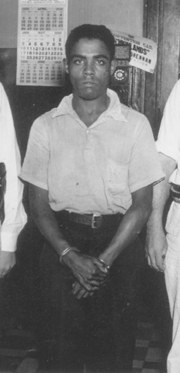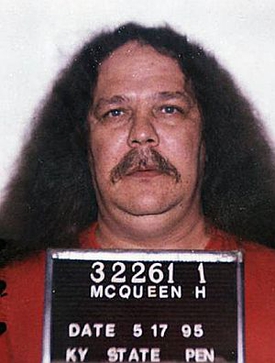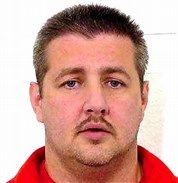Related Research Articles

In the United States, capital punishment is a legal penalty throughout the country at the federal level, in 27 states, and in American Samoa. It is also a legal penalty for some military offenses. Capital punishment has been abolished in 23 states and in the federal capital, Washington, D.C. It is usually applied for only the most serious crimes, such as aggravated murder. Although it is a legal penalty in 27 states, 20 states currently have the ability to execute death sentences, with the other seven, as well as the federal government, being subject to different types of moratoriums.

Capital punishment is a legal punishment under the criminal justice system of the United States federal government. It is the most serious punishment that could be imposed under federal law. The serious crimes that warrant this punishment include treason, espionage, murder, large-scale drug trafficking, or attempted murder of a witness, juror, or court officer in certain cases.
Capital punishment is a legal penalty in the U.S. state of Arkansas.

In the U.S. state of California, capital punishment is not allowed to be carried out as of March 2019, because executions were halted by an official moratorium ordered by Governor Gavin Newsom. Before the moratorium, executions had been frozen by a federal court order since 2006, and the litigation resulting in the court order has been on hold since the promulgation of the moratorium. Thus, there will be a court-ordered moratorium on executions after the termination of Newsom's moratorium if capital punishment remains a legal penalty in California by then.

Capital punishment is a legal penalty in the U.S. state of Ohio, although all executions have been suspended indefinitely by Governor Mike DeWine until a replacement for lethal injection is chosen by the Ohio General Assembly. The last execution in the state was in July 2018, when Robert J. Van Hook was executed via lethal injection for murder.

Rainey Bethea, was the last person publicly executed in the United States. Bethea, who confessed to the rape and killing of a 70-year-old woman named Lischia Edwards, was convicted of her rape and publicly hanged in Owensboro, Kentucky.

The use of capital punishment by the United States military is a legal punishment in martial criminal justice. Despite its legality, capital punishment has not been imposed by the U.S. military in over sixty years.
Capital punishment was abolished in Virginia on March 24, 2021, when Governor Ralph Northam signed a bill into law. The law took effect on July 1, 2021. Virginia is the 23rd state to abolish the death penalty, and the first southern state in United States history to do so.

Harold I. McQueen Jr. was an American man who was the first criminal executed by the state of Kentucky after the reinstatement of capital punishment in the United States in 1976. McQueen was sentenced to death on April 8, 1981, for shooting and killing an unarmed store clerk, Rebecca O'Hearn, while robbing the store in which she worked in Richmond, committed on January 17, 1980.

The Kentucky State Penitentiary (KSP), also known as the "Castle on the Cumberland," is a maximum security and supermax prison with capacity for 856 prisoners located in Eddyville, Kentucky on Lake Barkley on the Cumberland River, about 4.8 kilometres (3 mi) from downtown Eddyville. It is managed by the Kentucky Department of Corrections. Completed in 1886, it is Kentucky's oldest prison facility and the only commonwealth-owned facility with supermax units. The penitentiary houses Kentucky's male death row inmates and the commonwealth's execution facility. As of 2015 it had approximately 350 staff members and an annual operating budget of $20 million. In most cases, inmates are not sent directly to the penitentiary after sentencing, but are sent there because of violent or disruptive behavior committed in other less secure correctional facilities in the commonwealth. This was Kentucky's second penitentiary: the first was made uninhabitable from a flood in 1937.
Capital punishment in Connecticut formerly existed as an available sanction for a criminal defendant upon conviction for the commission of a capital offense. Since the 1976 United States Supreme Court decision in Gregg v. Georgia until Connecticut repealed capital punishment in 2012, Connecticut had only executed one person, Michael Bruce Ross in 2005. Initially, the 2012 law allowed executions to proceed for those still on death row and convicted under the previous law, but on August 13, 2015, the Connecticut Supreme Court ruled that applying the death penalty only for past cases was unconstitutional.
Capital punishment was abolished in Colorado in 2020. It was legal from 1974 until 2020 prior to it being abolished in all future cases.
Hanging has been practiced legally in the United States of America from before the nation's birth, up to 1972 when the United States Supreme Court found capital punishment to be in violation of the Eighth Amendment to the United States Constitution. Four years later, the Supreme Court overturned its previous ruling, and in 1976, capital punishment was again legalized in the United States. As of 2023, only New Hampshire has a law specifying hanging as an available secondary method of execution, and even then only for the one remaining capital punishment sentence in the state.

Marco Allen Chapman was a convicted murderer and as of 2023, the last person executed by the Commonwealth of Kentucky. He was executed on November 21, 2008, by lethal injection at the Kentucky State Penitentiary in Eddyville, Kentucky. Chapman was executed for a series of murders he committed on August 23, 2002, in Warsaw, Kentucky, on Weldon Way, killing two children, Chelbi Sharon, 7, and Cody Sharon, 6, by stabbing after he had raped and stabbed their mother, Carolyn Marksberry, the city clerk of Warsaw at the time, over 15 times. 10-year-old Courtney Sharon played dead after she had also been stabbed by Chapman several times, and escaped.
Capital punishment is a legal punishment in Tennessee.
Capital punishment is a legal punishment in Pennsylvania. Despite remaining a legal penalty, there have been no executions in Pennsylvania since 1999, and only three since 1976. In February 2015, Governor Tom Wolf announced a formal moratorium on executions that is still in effect as of 2023, with incumbent Governor Josh Shapiro continuing Wolf's moratorium. However, capital crimes are still prosecuted and death warrants are still issued.
Capital punishment is a legal penalty in the U.S. state of Kentucky.
Capital punishment in Malawi is a legal punishment for certain crimes. The country abolished the death penalty following a Malawian Supreme Court ruling in 2021, but it was soon reinstated. However, the country is currently under a death penalty moratorium, which has been in place since the latest execution in 1992.
Capital punishment is a legal penalty in Uganda. The death penalty was likely last carried out in 1999, although some sources say the last execution in Uganda took place in 2005. Regardless, Uganda is interchangeably considered a retentionist state with regard to capital punishment, due to absence of "an established practice or policy against carrying out executions," as well as a de facto abolitionist state due to the lack of any executions for over one decade.
References
- ↑ "Execution Database". Death Penalty Information Center . Retrieved July 30, 2022.
- ↑ Williams, Chris (November 21, 2018). "Kentucky has not executed a death row inmate in 10 years, here's why". WHAS-TV . Archived from the original on July 30, 2022. Retrieved July 30, 2022.